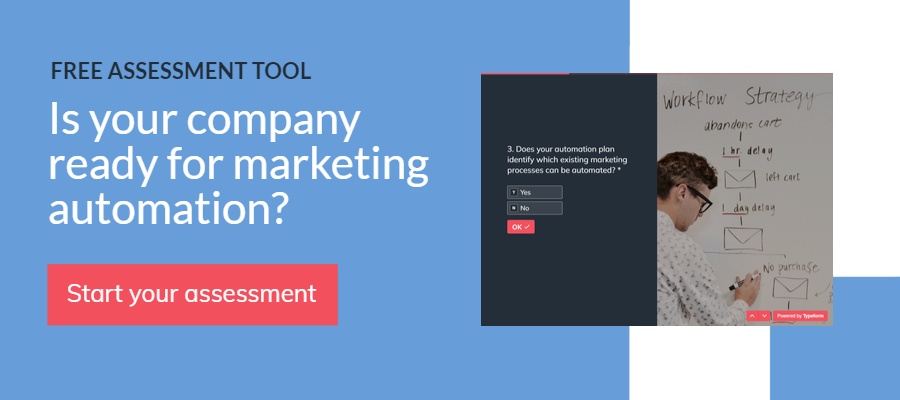According to The State of B2B Marketing Automation report, 53% of B2B organisations are already using marketing automation technology, and a further 37% say they are planning to implement it. As such, if your company hasn’t already invested in this type of software, it’s likely that they soon will.
We’ve previously discussed the benefits of marketing automation for life science companies, and how to avoid the common pitfalls companies make when implementing automation systems. In this final blog post of the series, we’ll discuss some of the automation software tools available to help you decipher which is the right tool for your life science organisation. Instead of a generic list, we’ve categorised the tools by purpose, so that you can make a more informed decision about which tool could help your company save time and money.
What are the advantages of marketing automation?
Before we get into the tools themselves, let’s briefly recap the main benefits of marketing automation: namely, that it can provide an affordable, scalable way to boost your marketing department’s productivity and effectiveness. The approach is well-suited to B2B organisations, particularly those that experience longer sales-cycles and more complex decision-making processes. It allows marketers to streamline and simplify previously repetitive tasks such as sending emails, scheduling social media posts, tracking user behaviour, reporting on performance and many other tasks. By saving you time, effort and resources, you’ll have the ability to focus on the more strategic and creative aspects of marketing.
There are many areas of your marketing mix where you can gain from investing in marketing automation solutions, but the main ones are:
- Automating communications with your contacts (customers, prospects etc.)
E.g. when a prospect downloads a piece of content from your website, you can automatically send them a thank you email or another piece of relevant content, or even push them into an automated series of emails that are sent over time.
- Automating internal communications
E.g. automatically sending notifications to sales reps to let them know that a new sales qualified lead has been created and allocated to them.
- Automating data changes and reporting
E.g. automatically segmenting your contacts based on information they give when they fill out a form. It can also allow you to analyse and report on your data without laborious manual processes.
- General workflow and process automation
E.g. the ability to create new blogs and social posts at the click of a button, based on existing templates.
Now that we’ve covered the main advantages that marketing automation can bring, let’s delve into some of the automation software tools (categorised by purpose) that are available and what they can offer life science organisations.
Skip ahead:
All-in-one marketing automation tools:
3. Keap (formally Infusionsoft)
4. LeadSquared
5. Sugar CRM (formally Salesfusion)
6. Act-On
7. Marketing Cloud (formally Pardot)
8. Eloqua
Email marketing automation tools:
9. Mailchimp
10. iContact
11. Constant Contact
12. Customer-io
Specialist marketing automation tools:
13. RollWorks
14. Clearscope
15. BuzzBuilder Pro
Integration tools:
16. Zapier
17. Make (formally Integromat)
18. Microsoft Power Automate (formally Microsoft Flow)
All-in-one marketing automation tools
An all-in-one marketing automation software provides a suite of tools designed to manage every aspect of your organisations marketing efforts in one place. Here we’ll delve deeper into some of the solutions available to life science organisations that are on the market today, and help you determine which could be most suited to your organisation based on various factors like cost, size of organisation etc.
1. HubSpot
HubSpot offers life science companies a complete inbound marketing and sales platform solution aiming to help companies attract visitors, convert leads and make more sales. It includes several tools like Marketing Hub, Sales Hub, Service Hub, and CMS (content management system) Hub, that allow both marketing and sales teams to manage all their activities in one place.
HubSpot is designed to help the teams within your businesses to function better together, from the first time a prospect hears about your business on social media, to the emails you send them, to handing them over to your sales team and to the customer service they receive. Useful features include a built-in customer relationship management platform (CRM), content management and creation, social media marketing, workflow automation, lead capture, sales pipeline mapping, and performance tracking and analysis.
HubSpot provides a powerful yet affordable, “all-in-one” option that’s easy to use and is well suited to small and mid-sized life science companies. If your organisation is looking to grow, the HubSpot platform can easily scale with you. Like many automation tools they offer a free trial, and also have free versions with limited functionality.
Stand-out feature: Ability to bring all business function platforms together in one place.
Organisation size: Most suitable for growing small and mid-sized companies.
Pricing: Starting from £0 – £3,000+ per month, based on contact database size and features.
2. Marketo
Owned by Adobe, Marketo is an all-in-one marketing automation platform built and designed to help companies automate and measure marketing engagement, tasks and workflows. With it, companies can engage the right customers through behaviour tracking, easily build and scale automated marketing campaigns, and determine exactly how marketing is impacting revenue. It uses rich behavioural data, built-in intelligence and sophisticated journey flows to identify and engage a company’s best opportunities (ideal for companies doing account-based marketing).
It also has features like lead management, marketing analytics, content personalisation, and customer experience automation. It doesn’t have a built-in customer relationship management system; however, it does integrate with a wide range of CRM platforms.
Ideal for mid-sized to enterprise life science organisations looking for a more comprehensive platform, Marketo also works well for growing companies as it’s easily scalable and offers a large, active knowledgebase of resources.
Stand-out feature: Offers account profiling powered by AI.
Organisation size: Most suitable for mid-sized to enterprise companies.
Pricing: Contact Marketo for pricing information.
3. Keap (formally Infusionsoft)
Keap, once known as Infusionsoft, is an all-in-one sales and marketing automation platform designed to help companies grow. Offering customer relationship management, marketing automation, and B2B e-commerce functionality in one product.
It makes marketing processes more efficient and effective because companies can segment their audience, track customer interactions, send emails, and run campaigns with personalised messaging.
The platform also has extensive reporting analytics tools that help companies to analyse their marketing efforts and spend based on parameters such as emails, campaign performance, and return on investment (ROI) data.
Ideal for smaller life science businesses that would prefer to keep their technology stack simple and cost-effective, without sacrificing too much in terms of functionality.
Stand-out feature: Built-in e-commerce functionality, while also providing an easy, organised view of essential data and information.
Organisation size: Most suitable for smaller companies.
Pricing: Starting from £115 – £175+ per month, based on database size and features.
4. LeadSquared
LeadSquared is a complete marketing automation and customer relationship management platform providing end-to-end sales, marketing and customer onboarding automation solutions. It aims to help companies automate tasks like lead capturing and scoring (but in an accelerated way), as well as reporting and analytics.
It also has features such as landing page creation, customisable email campaign creation, segmentation, role-based user access, and integrations with many other applications. With these features, it promises to increase sales and conversion rates and make all sales, marketing, and customer experience teams more productive.
Easy to use and suitable for companies of all sizes, LeadSquared is ideal for life science organisations starting out and looking for an all-encompassing solution with a particular focus on lead generation.
Stand-out feature: Unique ability to accelerate lead capturing and scoring.
Organisation size: Suitable for all company sizes.
Pricing: Starting from £350 – £2,000+ per month, based on contacts and features.
5. Act-On
Promising to be a comprehensive marketing automation tool designed to offer a complete suite of applications, Act-On's features include email marketing, website visitor tracking, lead management, social media management, reporting and analytics, and several integrations.
It enables companies to segment their customers into a variety of categories and target those customers with email marketing campaigns. It’s tracking features give marketers complete visibility into the types of customers that are visiting their website as well as their activities and the time spent on the website.
It also offers tools to build and optimise campaigns, generate leads and prioritise prospects while also being able to integrate with many of the leading CRMs on the market.
Aimed at B2B organisations looking for one environment to manage all their digital marketing activities, Act-On is most suited to small to mid-sized life science organisations with smaller marketing teams looking for a marketing automation platform that requires minimal IT involvement.
Stand-out feature: Offers extensive tracking and reporting options.
Organisation size: Most suitable for small to mid-sized companies.
Pricing: Starting from £750 – £7,000+ per month, based on contact database size and features.
6. Sugar CRM (formally Salesfusion)
Sugar CRM, previously known as Salesfusion, offers an on-premises or cloud-based web application with solutions covering CRM, marketing, sales and customer support automation.
The marketing platform aims to let companies streamline their campaign creation, understand engagement, and improve conversions and revenue. To do this it has several built-in advertising and social media tools to help drive web traffic, campaign builders that enable professional email, page and form creation, and personalised emails and lead scoring features that enable marketers to deliver qualified leads to the sales team.
It also features extensive analytics and reporting that give insight into marketing processes and allows companies to make better data-driven decisions.
This solution would suit mid-sized to enterprise life science organisations and those looking to build their automation tech stack over time, with options to easily purchase each part of the solution separately.
Stand-out feature: Offers extensive analytics and reporting options.
Organisation size: Most suitable for mid-sized to enterprise-level companies.
Pricing: From £800+ per month for marketing platform, based on number of contacts.
7. Marketing Cloud (formally Pardot)
If your life science company is focused on digital marketing approaches, Salesforce Marketing Cloud is worth considering. It’s a digital marketing platform that aims to provide a 360-degree view of your prospects and customers, whilst guiding them through the buying journey by automating marketing across a variety of digital channels.
It has many features including customer engagement in real-time, email marketing automation, mobile (SMS) messaging and push notifications, digital advertising and social media management. It also integrates with Google Analytics and now incorporates Pardot (previously a separate Salesforce marketing automation platform). These key features enable companies to deliver AI-powered automated customer personalisation, whilst enabling marketing to work productively with sales to build better customer relationships.
The product is most suitable for larger life science enterprises with bigger contact databases, as well as those already using Salesforce to drive their sales efforts. Ideal for life science companies looking to the future of marketing automation, Marketing Cloud allows you to cut costs by optimising various marketing touch points.
Stand-out feature: Create automated, personalised multi-channel customer journeys.
Organisation size: Most suitable for larger enterprise companies.
Pricing: Starting from £1,000 – £12,000+ per month, based on database size and depth of analytics.
8. Eloqua
Eloqua by Oracle is a fully loaded marketing automation solution created for marketers to track customers through all phases of the customer journey. It lets companies create more closed-loop marketing and sales activities and manage cross-channel B2B marketing campaigns that nurture leads in every stage of the buying process.
To do this it has features like sophisticated campaign orchestration, segmentation and targeting, lead management, asset management, sales and marketing alignment, and marketing analytics, all contained in one extensible and scalable platform that makes managing marketing campaigns easier.
Most similar to Marketo, Eloqua is best suited to life science companies looking for enterprise-level software and high levels of guidance upon implementation and beyond.
Stand-out feature: Reach impressive numbers of prospects autonomously.
Organisation size: Most suitable for larger enterprise companies.
Pricing: Contact Eloqua for pricing information.
Email marketing automation tools
If your life science organisation isn’t currently using marketing automation, it’s possible you’re not quite ready to invest in an all-in-one solution. However, if your priority is to automate your email marketing, you may choose to make a smaller investment into an email marketing automation tool. Here we’ll discuss just some of the options available to you.
9. Mailchimp
Mailchimp makes creating and sending newsletters, promotions, and automated email workflows easier and enables companies to build their business faster. Companies can simply build an email list with an online form or import their own contacts. To make campaign creation easier, Mailchimp offers predesigned email templates with a drag-and-drop builder. The system also offers social media integration that allows companies to post to Facebook, Twitter, and LinkedIn from within the platform, and offers customisable reports and dashboards that companies can use to monitor their campaign performance.
Originally specialising in email automation, MailChimp is now technically dubbed an all-in-one marketing platform offering other features like a marketing CRM, customer segmentation, behavioural targeting, reporting, A/B testing, and several integrations. However, for us, its real strength is still as an email marketing platform.
That being said, if you’re a small to medium life science business with a smaller database looking for an all-in-one option, then this could be for you. Offering a free plan, to which there is a monthly email limit of 10,000 sends with a daily cap of 2,000, and other flexible pay-as-you-go options, you can simply give it a try for free.
Stand-out feature: Simple, easy-to-use interface for email marketing customisation.
Organisation size: Most suitable for small to medium-sized companies.
Pricing: Starting from £0 – £250+ per month, based on list size and features.
10. iContact
iContact is an email marketing tool that offers email design, list management, campaign management, and social media publishing in one platform.
To make email marketing efforts easier, it contains a variety of email templates that companies can use to design content for their email campaigns. iContact also offers seamless integration with Salesforce CRM, enabling users to sync customer data to help build better relationships with leads, prospects and customers through email marketing.
Suitable for small life science businesses looking to get started with a straightforward email marketing automation platform, you can get started for free with its drag-and-drop email designer and free support, which allows up to 500 contacts and up to 2,000 sends per month.
Stand-out feature: Offers seamless integration with Salesforce.
Organisation size: Most suitable for smaller companies.
Pricing: Ranging £0 – £300+ per month, based on features and support.
11. Constant Contact
Constant Contact is a well-known email automation tool that has all the features to take any company's marketing efforts beyond just the basics. By using it, life science companies can become more proficient at using email and social advertising to acquire customers.
The system lets companies send targeted personalised emails to contacts and resend those emails to the contacts that didn't open the email the first time. Its in-depth reporting enables companies to analyse and understand their combined success over time, including which contacts were engaged by the campaign.
For a life science company running lots of events, Constant Contact also offers event management functionality, making it easier to promote events.
Ideal for smaller businesses, the system’s basic functionality is great for less technical users as it is very easy to use. Constant Contact also offers a more comprehensive all-in-one marketing automation platform, so could be a good, affordable option for smaller life science organisations that are looking to start with email marketing automation and possibly expand their automation efforts in the future.
Stand-out feature: Offers event invitation management.
Organisation size: Most suitable for smaller companies.
Pricing: Starting from £8 – £34+ per month for email marketing services, based on list size and core features.
12. Customer.io
Customer.io is an automated messaging platform for sending targeted and automated emails, push notifications, and messages that simplify the process of engaging and retaining an audience. It harnesses real-time behavioural data and advanced segmentation across the web and mobile channels to empower marketers to send contextually relevant communication that creates a great customer experience that, in turn, leads to customer retention and increased sales.
To do this, Customer.io has features like a comprehensive segmentation platform, workflow automation, built-in message editors, and customer collection querying. It also offers several options for integration that allows companies to use their business data to power their automated messaging.
For smaller life science organisations looking to get started with email marketing automation, Customer.io is worth your consideration. Ideal for tech-savvy marketers, with a lightweight, flexible UI, if you’re willing to put in some developer time, it’s possible to customise the tool to precisely fit your needs.
Stand-out feature: Offers a flexible, customisable UI (for tech-savvy marketers).
Organisation size: Most suitable for smaller companies.
Pricing: Starting from £130+ per month, based on features and support.
Specialist marketing automation tools
There are various marketing automation tools available with a range of abilities. In this section, we’ll explore some of the specialist options designed for specific applications that are available for life science organisations to consider.
13. RollWorks
RollWorks is an account-based marketing (ABM) platform for B2B marketing and sales groups. It aims to enable users to easily focus their marketing efforts on reaching the specific accounts and buyers they care about – on any device and across multiple channels.
It includes features like behavioural targeting to deliver certain ads based on observed contact behaviour. In essence, marketers can set key parametric and metrics, which are then used to ensure their retargeting ad campaigns are automatically optimised and personalised based on content and messages a user has engaged with in the past.
Regardless of your organisation size, if your life science company is using an ABM-based strategy, then RollWorks might be a good tool for you to explore.
Stand out feature: ABM-specific reporting to gain a deeper understanding of your accounts.
Organisation size: Most suitable for companies focussed on ABM.
Pricing: Starting from £850+ per month, based on features and number of users.
14. Clearscope
Clearscope is an AI-powered SEO content optimisation platform allowing users to produce content that ranks in search results. It assists content creation by providing AI-powered content reports based on real-time data from Google.
Some of its key features include SEO auditing, competitor analysis on key metrics and insights into existing content. Clearscope also offers tools to optimise content for search, such as long-tail keywords, audience insights, content intelligence, and an AI writing assistant.
As part of its reporting functionality, Clearscope offers recommendations for users to fix potential issues or improve content based on analysis of Google SERPs content. This includes the average word count for top-performing content, giving users a better idea of what to aim for.
Clearscope is best suited to any life science organisations looking to save time in creating SEO optimised content that ranks on search engine results pages.
Stand out feature: Multiple tools to improve your approach to SEO.
Organisation size: Suitable for any company leveraging SEO as a marketing tool.
Pricing: Starting from £145 – £1,000+ per month, based on number of users and features.
15. BuzzBuilder Pro
BuzzBuilder Pro is a lead generation and content marketing platform that helps companies to create successful online marketing campaigns. It offers powerful automation tools, email campaigns, website visitor tracking, and follow-up lists that take the complexity out of lead generation. It also offers features like reporting and analytics, email templates with an editor, lead scoring, and optimised email delivery. With these tools, companies can get more qualified leads and generate more revenue. As such, BuzzBuilder Pro would be most suited to any sized life science organisation with a focus on prospecting.
Stand-out feature: Offers alerts for ‘hot’ leads.
Organisation size: Suitable for any size of company focussed on prospecting and lead generation.
Pricing: Contact BuzzBuilder Pro for pricing information.
Integration tools
More often than not, companies will use more than one of the tools discussed in this blog post to help support their marketing strategy and efforts. For example, a company might use an email automation tool for marketing and a customer relationship management tool to improve their customer experience.
As we've said above, it's vital that all these systems be integrated to take advantage of the data that they are generating and to ensure a “single point of truth” about each contact in your database. With this in mind, here are some integration tools that can help you ensure that data is flowing freely and accurately between the different systems you are using. The best tools in this area allow you to connect your systems with little to no coding knowledge.
16. Zapier
Zapier is a cloud-based integration platform that helps companies to automate their daily marketing workflows, especially when this involves several marketing tools or applications. This enables companies to transition data between the different applications automatically while integrating apps with one-click functionality. One of the main advantages of Zapier is that it requires little to no code knowledge or experience.
Some of Zapier’s features include the ability to automate repetitive task reminders, a bank of templates to work from, an activity dashboard, API maintenance, triggers and actions, and an online developer portal. By enabling the seamless sharing of data between several marketing platforms, Zapier contributes to making marketing processes more efficient, accurate, and effective.
Stand-out feature: Integrates with hundreds of well-known software tools and platforms.
Organisation size: Suitable for any size company.
Pricing: Starting from £0 - £500+ per month, based on the number of tasks and features.
17. Make (formally Integromat)
Make, previously known as Integromat, is an integration Platform as a Service (iPaaS) and automation platform that aims to boost productivity across all areas of your business. It allows you to visually create, build and automate workflows using a simple drag-and-drop interface to connect apps in seconds.
With an intuitive and user-friendly design, much like Zapier, it requires little to no code knowledge or experience. Features include its workflow builder, real-time integration, pre-built connectors, data mapping and notification management.
Stand-out feature: Offers an option for quick enterprise scaling.
Organisation size: Suitable for any size company.
Pricing: Ranging from £0 - £25+ per month, based on number of integrated apps and features.
18. Microsoft Power Automate (formally Microsoft Flow)
Microsoft Power Automate, which now incorporates its once separate tool, Microsoft Flow, is an enterprise system that helps you create automated workflows between your apps and services. Aiming to help your business increase productivity and business efficiency, you can: quickly automate your workflows, enable business logic to simplify tasks, and connect your processes with Microsoft Power Automate.
If solution support is important to your life science organisation, then Microsoft Power Automate might be a suitable option for you, offering a support community, 24/7 live rep and phone and chat support.
Stand-out feature: Simple but effective user experience, with a high level of customer support.
Organisation size: Suitable for any size company.
Pricing: A variety of options, including pay-as-you-go (£0.50+), as well as pay monthly by user or flow (£13+ per month)
How to decide which marketing automation software tool to use?
There are many marketing automation software tools available to help save life science companies time and money, with more being created every year. However, before selecting a tool, it is important to establish a plan for what you hope to achieve using automation, as well as the types of processes you will automate (for more information on this topic, read our previous blog post on some of the common marketing automation pitfalls).
To help life science organisations plan for the successful implementation of marketing automation, we’ve put together a 10-step marketing automation ‘readiness’ tool. Simply fill in the short questionnaire for advice and recommendations on how to ensure your marketing automation project is as smooth and successful as possible.




